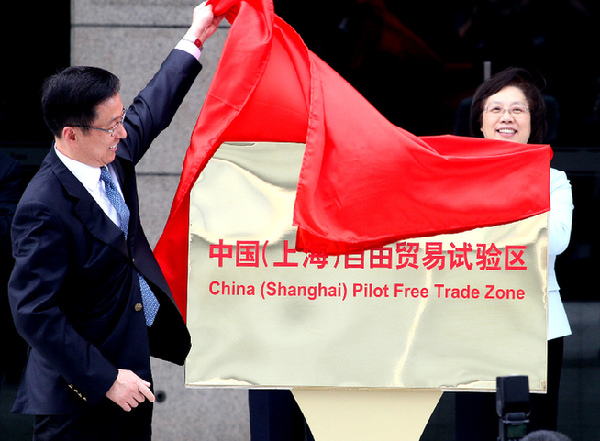Q&A for Shanghai's free trade zone
- By Zhang Rui
 0 Comment(s)
0 Comment(s) Print
Print E-mail China.org.cn, October 9, 2013
E-mail China.org.cn, October 9, 2013
|
The China (Shanghai) Pilot Free Trade Zone was launched this morning, marking a trial run for groundbreaking changes to free up cross-border commodity and capital flows in the world's second largest economy. A first batch of 25 Chinese and overseas companies were granted the licenses to register in the trial zone this morning. [Photo/Xinhua] |
Q: What do the "first line" and "second line" of Shanghai FTZ stand for?
A: The "first line" refers to FTZ's passage to overseas areas. "Opening the first line" means foreign cargo can freely enter and exit the FTZ from abroad without the intervention of customs authorities. The declaration and quarantine procedures will be simplified.
The "second line" refers to the gate between the FTZ and customs, if any cargo enters the domestic areas from the FTZ, or any cargo from domestic areas wants to enter the FTZ, customs will collect duties and taxes according to the relevant laws and regulations; supervision will be strengthened.
Q: What are the changes for the foreign investment administration?
A: Foreign investors will enjoy a pre-establishment national treatment in the FTZ and will have no need for government approval before setting up business as long as they formalize their arrangements after the fact and do not operate in any sectors featured on a "negative list." Foreign investors will only need to go through registration procedures to start their business. The FTZ suspends 11 different administrative approvals regulated by three different laws covering foreign-capital enterprises, Chinese-foreign equity joint ventures and Chinese-foreign contractual joint ventures.
Previously, foreign investors had to prepare a feasibility report, get the ministry's approval and register with local branches of the industry and commerce administration. An exemption from the laws will also entail looser restrictions on the shares of ownership any foreign investor can obtain in a Chinese business.
Q: What is a "negative list"?
The Shanghai FTZ will adopt a "negative list" approach towards foreign investment management, meaning foreign investment in all sectors should be allowed unless listed as prohibited or restricted on the negative list. Anything outside of the list will be allowed and doesn't need government approval. For example, Internet cafes, gambling and porn are all put on the list and thus not allowed.
Q: What is pre-establishment national treatment?
Foreign investors in the FTZ will receive the same treatment as their Chinese counterparts during the pre-establishment phase of their business.
Q: What is the competitive neutrality principle?
A: Fair competition. Any corporation and individual will receive equal treatment in business activities.
Q: It is reported that the FTZ will expand the opening-up of the service industry. What domains will Shanghai FTZ touch on?
A: The Shanghai FTZ will first open up finance, shipping, trade, professional, culture and society services.
Q: What is professional service?
A: The term "professional service" refers to the special service provided by a certain institution or individual who manages certain professional knowledge and techniques as per clients' demands. Their knowledge and technology requirements are high.
This time the FTZ opens up the following professional areas: Legal service, credit investigation, tourist agencies, talent agencies, investment management, engineering design and construction service.
Q: What are the financial innovations of the FTZ?
A: As long as risks are controllable, local authorities can "create conditions" for the "pilot and test" of RMB capital account convertibility, the liberation of interest rates on the financial market, as well as the cross border use of the RMB, the financial industry's full opening-up to private and foreign financial institutions and offshore financial services. Foreign banks and Chinese-foreign joint venture banks are allowed to set up business in the FTZ. International stock exchange platforms are also allowed to be established in the FTZ.
Q: What is a convertible RMB capital account?
A: Currently in China, the RMB is convertible on current accounts but not on capital accounts, you can convert RMB to US dollars for tourism purposes, but you cannot do this with the aim of financial investment. Now, in the FTZ, you can freely convert RMB to invest in any markets such as buying stocks in foreign countries.
Q: What is a finance lease?
A: A finance lease is a new way to acquire equipment instead of a direct purchase. For example, if an enterprise wants to buy an airplane valued at US$53 million, the direct buying will have to pay 76.3 million yuan more as duties and value added tax are included, making it a huge financial strain. Yet within the FTZ, the 8-year finance lease agreement will only pay 3.09 million yuan as duties and value added tax are only included for the first phase rents, sharply reducing the financial pressure on the lessee company.
Q: What is interest rate liberation?
A: At this time, the deposit interest rate is the benchmark interest rate set by the People's Bank of China. Chinese banks can only raise 10 percent of the rate based on the benchmark. The interest rate liberation will cancel the benchmark interest rate and let the market decide the rate.
Q: What is offshore financial business?
An offshore financial business usually specializes in providing corporate and commercial services to non-resident offshore companies, as well as oversees the investment of offshore funds. Non-residents will not be affected by any domestic foreign currency administration or finance laws and regulations and can therefore trade freely. The offshore financial market will not badly impact domestic market, but can help develop taxes, jobs, real estate and relevant industries.







Go to Forum >>0 Comment(s)